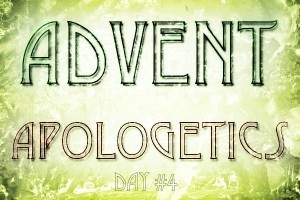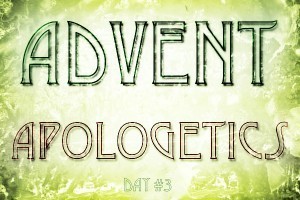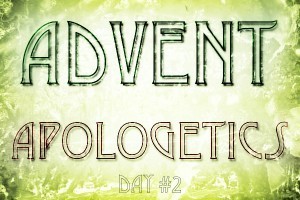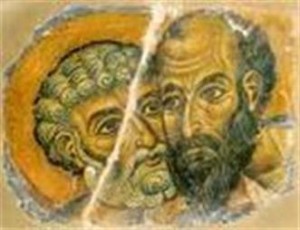Miguel Labrador's Blog, page 5
December 4, 2013
Advent Apologetics Day #4 – Christ Conquered Chaos
 “Do not suppose that I have come to bring peace to the earth. I did not come to bring peace, but a sword.” (Matthew 10:34) This verse is not about apologetics. Unfortunately many use it to justify their chaotic abrasiveness.
“Do not suppose that I have come to bring peace to the earth. I did not come to bring peace, but a sword.” (Matthew 10:34) This verse is not about apologetics. Unfortunately many use it to justify their chaotic abrasiveness.
We’ll eventually get to everyone’s favorite apologetics verse, 1 Peter 3:15, but over the course of the next couple of weeks I wanted to look at some seldom considered apologetics texts and combine them with some Advent meditations. Here is today’s text.
Let the peace of Christ rule in your hearts, to which indeed you were called in one body; and be thankful. Let the word of Christ richly dwell within you, with all wisdom teaching and admonishing one another with psalms and hymns and spiritual songs, singing with thankfulness in your hearts to God. Whatever you do in word or deed, do all in the name of the Lord Jesus, giving thanks through Him to God the Father. (Col 3:15-17)
We should strive for peace with one another because Christ has conquered chaos (Col 3:15)
Advent Apologetics assumes the role of a peacemaker. (Matthew 5:9) If your apologetics is disrupting peace or creating chaos, then it might be time to reconsider your approach. Of course this begs the question; “Can apologetics be peaceful?” I’d like to answer that question with a quote from an unlikely source, John F. Kennedy –
“If we make peaceful revolution impossible, we make violent revolution inevitable.”
There is much violence in modern apologetics. Violence thrives in chaos. Advent Apologetics seeks peace, establish bridges to peace and uses peace a conduit for hope. Alister Mcgrath, in Mere Apologetics: How to Help Seekers and Skeptics Find Faith (p. 154) states:
“Many are moved to ask about faith when they realize that their friends seem to have something they do not—for example, a sense of peace or purpose, or a deep-seated compassion and love for their fellow human beings. “Where did that come from?” they ask, secretly wondering if they could possess it as well. The love of God is both embodied and proclaimed when Christians serve their neighbors or the world.”
See the progression there? Love – Embodiment – Service – Curiosity – Peace.
An Advent Apologetic is one that creates a space where others can dialogue. It’s not one that puts more space between those that have hope and peace and those that need it.
* For the past 7 years, my wife and I have been adventing by providing tons of food to the families in need during the holiday season. It’s not a fanfare and forget event. We go back throughout the year and visit with them, pray with them, and give them a message of hope. Please consider sponsoring one family this year. Find out more here.
(Visited 16 times, 1 visits today)














CommentsThanks Lito. One mind, one body, one baptism. But sometimes, it ... by Kirk StephensRelated StoriesAdvent Apologetics Day #3 – Helpless Doesn’t Mean HopelessAdvent Apologetics Day #2Advent Apologetics Day #1
December 3, 2013
Advent Apologetics Day #3 – Helpless Doesn’t Mean Hopeless
 If your apologetic isn’t rooted in hope, then it’s just an argument from malice.
If your apologetic isn’t rooted in hope, then it’s just an argument from malice.
Advent Apologetics is about hope for the helpless. Dietrich Bonhoeffer said;
“A prison cell, in which one waits, hopes… and is completely dependent on the fact that the door of freedom has to be opened from the outside, is not a bad picture of Advent.”
Advent apologetics doesn’t put winning arguments over winning some. (1 Corinthians 9:22) It doesn’t assume a posture of defense with discipleship. It doesn’t contend without caring. It doesn’t overstate its case. It’s not the impersonal deliverance of facts meant to convince people rationally that Christianity is true. Advent apologetics “hopes all things.” (1 Corinthians 13:7)
Advent Apologetics is about being the body of Christ in the midst of people. It’s not about being God’s body-guard. While I respect much of what John Calvin has written, I’d have to take issue with this statement;
“A dog barks when his master is attacked. I would be a coward if I saw that God’s truth is attacked and yet would remain silent.”
Assuming this posture makes us ready to pounce on others instead of being to esteem them higher than ourselves. Quietness in apologetics, the absence of words, can be a powerful alternative. Hope incarnated depends and waits for God. Todays obscure apologetics text is Job 5:13-16;
“He captures the wise by their own shrewdness,
And the advice of the cunning is quickly thwarted.
“By day they meet with darkness,
And grope at noon as in the night.
“But He saves from the sword of their mouth,
And the poor from the hand of the mighty.
“So the helpless has hope,
And unrighteousness must shut its mouth.
“Apologetics often attracts people who have been emotionally hurt, and in turn, who use apologetics to hurt other people.” ~ Mark Matlock
Our goal in Advent Apologetics is not to hurt or hate or try to shut their mouths, but to recognize helplessness and be hopeful. Taking attacks of God’s truth personally might be a signal that you’re not personable. Jesus already took it all personable so you don’t have to. We’re leading up to 1 Peter 3:15 on Christmas Eve during advent. I’d invite you to come back for Day #4 tomorrow.
For the past 7 years, my wife and I have been adventing by providing tons of food to the families in need during the holiday season. It’s not a fanfare and forget event. We go back throughout the year and visit with them, pray with them, and give them a message of hope. Please consider sponsoring one family this year. Find out more here.
(Visited 1 times, 1 visits today)













 Related StoriesMissional, Yes… But Still Missionary-ish Too.In my head, I’d probably call it ‘Apostolic Discipleship,’ but…Advent Apologetics Day #2
Related StoriesMissional, Yes… But Still Missionary-ish Too.In my head, I’d probably call it ‘Apostolic Discipleship,’ but…Advent Apologetics Day #2
December 1, 2013
Advent Apologetics Day #2 – Living and Searching Together
 Each day, during Advent, I’ll be posting a short article relating apologetics and Advent. This is the second part in the series. I’d invite you to read the first part here.
Each day, during Advent, I’ll be posting a short article relating apologetics and Advent. This is the second part in the series. I’d invite you to read the first part here.
Advent and Apologetics do belong together. Yesterday, I said that I would proceed on the following 2 assumptions in developing this series:
1. “Apologetics is not about defending your faith.”
and
2. “Advent is about being hopeful amongst others.”
Os Guinness had this to say regarding apologetics, “Culturally, one of the best arguments we can make is, wait and see.”
It’s the hopeful attitude of active waiting that captures the imagination of people. Standing around debating theological theory might be intellectually stimulating, but does very little in the way of transformative convincing. Advent is, or should be, about waiting, watching, and working in our hope.
As I said in the previous post, I hope to lead up the to linchpin text of Christian Apologetics, 1 Peter 3:15, by using some other obscure and often overlooked passages from the bible.
In our text for today, Paul tells the Colossians…
“We always thank God, the Father of our Lord Jesus Christ, when we pray for you, since we heard of your faith in Christ Jesus and of the love that you have for all the saints, because of the hope laid up for you in heaven. Of this you have heard before in the word of the truth, the gospel which has come to you, as indeed in the whole world it is bearing fruit and increasing as it also does among you, since the day you heard it and understood the grace of God in truth… To them God chose to make known how great among the Gentiles are the riches of the glory of this mystery, which is Christ in you, the hope of glory.” Colossians 1:3-6,27
Again, we see that a hope anticipated, activates the people of God to live amongst the “Gentiles” or unbelievers in such a way as to make known the glory of our hope, Jesus the Christ.
Instead of a militaristic apologetic that assumes a defensive posture, the Advent Apologist seeks to enter into communal vulnerability with the unsure and be hopeful among them.
J.D. Greear, in “Gospel: Recovering the Power that Made Christianity Revolutionary,” says;
“In a post-Christian, skeptical age, love on display is the most convincing apologetic.”
An Advent Apologetic is one that does not seek to control others by amassing information and dominating the conversation, but one that is ready to say “I don’t know, but come let us live and search for the answer together.”
Check out this Cyber Monday Apologetics Ebook Deal for only $2.99 – Five Views on Apologetics (Counterpoints: Bible and Theology)
* My name is Miguel Labrador. My wife Claudia and I are missionaries in the Cloud Forest Region of Ecuador. We have been Adventing for the past 7 years by providing food to those in the region that have needed it most during the holiday season. We’d invite you to join us in this. Find out more.
(Visited 46 times, 1 visits today)













 Related StoriesAdvent Apologetics Day #1Missional, Yes… But Still Missionary-ish Too.Until…
Related StoriesAdvent Apologetics Day #1Missional, Yes… But Still Missionary-ish Too.Until…
Advent Apologetics Day #2
 This is the second part of a 24 part series on Advent Apologetics. I’d invite you to read part 1 here.
This is the second part of a 24 part series on Advent Apologetics. I’d invite you to read part 1 here.
Advent and Apologetics do belong together. Yesterday, I said that I would proceed on the following 2 assumptions in developing this series:
1. “Apologetics is not about defending your faith.”
and
2. “Advent is about being hopeful amongst others.”
Os Guinness had this to say regarding apologetics, “Culturally, one of the best arguments we can make is, wait and see.”
It’s the hopeful attitude of active waiting that captures the imagination of people. Standing around debating theological theory might be intellectually stimulating, but does very little in the way of transformative convincing. Advent is, or should be, about waiting, watching, and working. In our text for today, Paul tells the Colossians…
“We always thank God, the Father of our Lord Jesus Christ, when we pray for you, since we heard of your faith in Christ Jesus and of the love that you have for all the saints, because of the hope laid up for you in heaven. Of this you have heard before in the word of the truth, the gospel which has come to you, as indeed in the whole world it is bearing fruit and increasing as it also does among you, since the day you heard it and understood the grace of God in truth… To them God chose to make known how great among the Gentiles are the riches of the glory of this mystery, which is Christ in you, the hope of glory.”
Again, we see that a hope anticipated, activates the people of God to live amongst the “Gentiles” or unbelievers in such a way as to make known the glory of our hope, Jesus the Christ.
Instead of a militaristic apologetic that assumes a defensive posture, the Advent Apologist seeks to enter into communal vulnerability with the unsure and be hopeful among them.
J.D. Greear, in “Gospel: Recovering the Power that Made Christianity Revolutionary,” says;
“In a post-Christian, skeptical age, love on display is the most convincing apologetic.”
An Advent Apologetic is one that does not seek to control others by amassing information and dominating the conversation, but one that is ready to say “I don’t know, but come and let’s search for the answer together.”
My name is Miguel Labrador. I, along with my wife Claudia, are missionaries in the Cloud Forest Region of Ecuador. We have been Adventing for the past 7 years by providing food to those in the region that have needed it most during the holiday season. We’d invite you to join us in this. Find out more.
(Visited 1 times, 1 visits today)













 Related StoriesAdvent Apologetics Day #1Missional, Yes… But Still Missionary-ish Too.Until…
Related StoriesAdvent Apologetics Day #1Missional, Yes… But Still Missionary-ish Too.Until…
Advent Apologetics Day #1 – What’s it All About?
 In Advent, we’re reminded of how much we also need a Savior. We look back to those who longed for His coming and forward to His return even as we prepare to celebrate his His historic entrance into the world at Christmas time.
In Advent, we’re reminded of how much we also need a Savior. We look back to those who longed for His coming and forward to His return even as we prepare to celebrate his His historic entrance into the world at Christmas time.
The word “Advent” comes from the Latin word “adventus,” which means “coming” or “visit.” In the season with this name, we keep in mind both “advents” of Christ, the first in Bethlehem and the second yet to come.
Christian Apologetics has gotten a bad name, and I believe it’s deserving. Angry red-faced men with loud voices speak cleverly crafted words to defend their stances while speaking little of the Savior and the hope of His Gospel.
B. B. Warfield, nicknamed “The Lion of Princeton,” defined apologetics as:
“The systematically organized vindication of Christianity in all its elements and details, against all opposition.” (Works, 9:5)
Much of modern apologetics remains rooted in this militaristic mind-set, tactics over tactfulness, hype over hope, and debate over discipleship. It might seem odd to throw Advent and Apologetics into the same arena, but for the next 24 days, I’ll operate under the following two assumptions;
“Apologetics is not about defending your faith.”
and
“Advent is about being hopeful amongst others.”
Advent Apologetics is about being inclined to hope and poised to demonstrate that hope amongst others. It’s about being a living sacrifice and our reasonable service of worship to God and others. (Romans 12:1)
Over the course of Advent, I hope to lead up the to linchpin text of Christian Apologetics, 1 Peter 3:15, by using some other obscure and often overlooked passages from the bible.
Today’s text is Jeremiah 1:9,10
“Then the Lord stretched out His hand and touched my mouth, and the Lord said to me,
“Behold, I have put My words in your mouth.
“See, I have appointed you this day over the nations and over the kingdoms,
To pluck up and to break down,
To destroy and to overthrow,
To build and to plant.”
This passage speaks to the true connection of Apologetics and Advent. It starts with hope for Jeremiah and the people and ends with the same. It’s about deconstructing and restructuring unhopeful assumptions, residing in community, and reassuring those who need it most. It’s about accepting our calling to do God’s will amongst His people in His strength. It’s about advocating in the transformational frontiers. It’s about recognizing our struggles and the struggles of others as we live and move and have our being. It’s about alleviating fear which paralyzes hope and remembering God’s promises as we ADVENTure out.
I am a missionary in the Cloud Forest Region of Ecuador, and along with my wife, have been Adventing for the past 7 years by providing food to those in the region that need it most during the holiday season. We’d invite you to join us in this. Find out more.
(Visited 55 times, 1 visits today)













 Related StoriesMissional, Yes… But Still Missionary-ish Too.A Dozen More Black Friday Ebook Deals For Christian ReadersA Dozen More Black Friday Ebook Deals For Cristian Readers
Related StoriesMissional, Yes… But Still Missionary-ish Too.A Dozen More Black Friday Ebook Deals For Christian ReadersA Dozen More Black Friday Ebook Deals For Cristian Readers
Advent Apologetics Day #1
 In Advent, we’re reminded of how much we also need a Savior. We look back to those who longed for His coming and forward to His return even as we prepare to celebrate his His historic entrance into the world at Christmas time.
In Advent, we’re reminded of how much we also need a Savior. We look back to those who longed for His coming and forward to His return even as we prepare to celebrate his His historic entrance into the world at Christmas time.
The word “Advent” comes from the Latin word “adventus,” which means “coming” or “visit.” In the season with this name, we keep in mind both “advents” of Christ, the first in Bethlehem and the second yet to come.
Christian Apologetics has gotten a bad name, and I believe it’s deserving. Angry red-faced men with loud voices speak cleverly crafted words to defend their stances while speaking little of the Savior and the hope of His Gospel.
B. B. Warfield, nicknamed “The Lion of Princeton,” defined apologetics as:
“The systematically organized vindication of Christianity in all its elements and details, against all opposition.” (Works, 9:5)
Much of modern apologetics remains rooted in this militaristic mind-set, tactics over tactfulness, hype over hope, and debate over discipleship. It might seem odd to throw Advent and Apologetics into the same arena, but for the next 24 days, I’ll operate under the following two assumptions;
“Apologetics is not about defending your faith.”
and
“Advent is about being hopeful amongst others.”
Advent Apologetics is about being inclined to hope and poised to demonstrate that hope amongst others. It’s about being a living sacrifice and our reasonable service of worship to God and others. (Romans 12:1)
Over the course of Advent, I hope to lead up the to linchpin text of Christian Apologetics, 1 Peter 3:15, by using some other obscure and often overlooked passages from the bible.
Today’s text is Jeremiah 1:9,10
“Then the Lord stretched out His hand and touched my mouth, and the Lord said to me,
“Behold, I have put My words in your mouth.
“See, I have appointed you this day over the nations and over the kingdoms,
To pluck up and to break down,
To destroy and to overthrow,
To build and to plant.”
This passage speaks to the true connection of Apologetics and Advent. It starts with hope for Jeremiah and the people and ends with the same. It’s about deconstructing and restructuring unhopeful assumptions, residing in community, and reassuring those who need it most. It’s about accepting our calling to do God’s will amongst His people in His strength. It’s about advocating in the transformational frontiers. It’s about recognizing our struggles and the struggles of others as we live and move and have our being. It’s about alleviating fear which paralyzes hope and remembering God’s promises as we ADVENTure out.
I am a missionary in the Cloud Forest Region of Ecuador, and along with my wife, have been Adventing for the past 7 years by providing food to those in the region that need it most during the holiday season. We’d invite you to join us in this. Find out more.
(Visited 42 times, 3 visits today)













 Related StoriesMissional, Yes… But Still Missionary-ish Too.A Dozen More Black Friday Ebook Deals For Christian ReadersA Dozen More Black Friday Ebook Deals For Cristian Readers
Related StoriesMissional, Yes… But Still Missionary-ish Too.A Dozen More Black Friday Ebook Deals For Christian ReadersA Dozen More Black Friday Ebook Deals For Cristian Readers
November 28, 2013
A Dozen More Black Friday Ebook Deals For Christian Readers
Enjoy these 12 discounted ebooks for your Kindle or kindle enabled device and consider the opportunity at the intermission.
God’s Smuggler [Kindle Edition] by
Brother Andrew, John Sherrill, and Elizabeth Sherrill - $2.51
Embracing Obscurity: Becoming Nothing in Light of God’s Everything [Kindle Edition] by Anonymous - $0.99
Name Above All Names [Kindle Edition] by
Alistair Begg and Sinclair B. Ferguson - $3.99
Complete Works of E. M. Bounds on Prayer, The: Experience the Wonders of God through Prayer [Kindle Edition] by
E. M. Bounds (Author), Pastor Cymbala (Foreword) - $2.99
Praying Backwards: Transform Your Prayer Life by Beginning in Jesus’ Name [Kindle Edition] by
Bryan Chapell - $1.99
Intermission
Consider sponsoring a Christmas Basket of food for a family in the Ecuadorean Cloud Forest Region this holiday season. To find out more, visit this link
Stop Asking Jesus Into Your Heart: How to Know for Sure You Are Saved [Kindle Edition] by
J.D. Greear – $3.71
Get Offa My Case! [Kindle Edition] by
Rick Horne – $1.99
14 Shifts in Disciple Making and A Framework – A Dynamic E-booklet [Kindle Edition] by
Miguel Labrador – $0.99
Sermon on the Mount (The Story of God Bible Commentary) [Kindle Edition] by
Tremper Longman III and Scot McKnight - $4.27
Delighting in the Trinity: An Introduction to the Christian Faith [Kindle Edition]
Michael Reeves - $2.99
Two Views on Women in Ministry (Counterpoints: Bible and Theology) [Kindle Edition] by
James R. Beck, Craig L. Blomberg, Craig S. Keener, Linda L. Belleville, Thomas R. Schreiner, and Ann L. Bowman – $2.99
A Proverbs Driven Life [Kindle Edition] by
Anthony Selvaggio – $1.99
I’ll be posting a lot more of these deals which will often include free Christian Ebooks.
Just click the “subscribe” button on the upper right to get notified.
(Visited 44 times, 9 visits today)













 Related StoriesA Dozen More Black Friday Ebook Deals For Cristian ReadersThou Art The Church Which Causeth Poverty!Until…
Related StoriesA Dozen More Black Friday Ebook Deals For Cristian ReadersThou Art The Church Which Causeth Poverty!Until…
November 27, 2013
Until…
 After 7+ years on the mission field, I suppose it’s natural to wonder how much longer we’ll be doing this. It seems that many have asked us recently how much longer we plan on “doing what it is we’re doing” here in the Cloud Forest Region of Ecuador. It’s been a tough year emotionally, but very successful with regards to ministry. Being and Making Disciples always comes at a cost.
After 7+ years on the mission field, I suppose it’s natural to wonder how much longer we’ll be doing this. It seems that many have asked us recently how much longer we plan on “doing what it is we’re doing” here in the Cloud Forest Region of Ecuador. It’s been a tough year emotionally, but very successful with regards to ministry. Being and Making Disciples always comes at a cost.
Missionaries tend go through all sorts self-critical thoughts when beginning to execute or think about an exit strategy or when, for one reason or another, are forced to leave their ministry areas. There’s guilt, sadness, anxiety, and a full range of other emotions. We’re no different.
We remain the only cross-cultural missionaries in the region and have been so for as many years. The Lord has brought other workers for the harvest, but none have stayed. It’s ok, it’s driven us very deep into the culture and yielded much fruit.
Both my wife and I have had the opportunity to be back in the States this year for extended times and have visited family, been encouraged by friends, and participated in numerous ministries there. After spending a bit of time in the culture “we grew up in,” it’s always challenging to readjust to this environment. It’s a hard life. In thinking about the real possibility of returning to the States, I sought the Lord in intense and constant prayer. Ultimately, it boiled down to one question; “Lord, how much longer are we supposed to do this?” He answered… He said “Until…”
“Until…”
I suppose some would consider that answer annoying, frustrating, and incomplete, but it has brought me the experience of God’s peace, which exceeds anything I could have understood, a peace which is guarding my heart and mind as I continue to live “until” in Christ Jesus. (Philippians 4:7) I can honestly say that I have not experienced this level or sort of before.
So for now, I’ll not submit God’s mission for us to my whims or the fanciful notions of others, but Stay until, Go Until, Speak Until, Make Him known Until, Wait Until, Assemble Until, Be Until, Partake Until, Participate Until, Stop Until, Know Until, Give Until, and dwell on “until” for as long as, or until God directs otherwise.
The “Until” is uncomfortable, unknowable, and unexplainable. It places me in that position where I must depend on, listen to, and be disposed to God’s leading. I like being in that position. I hope to write a document called “The Until Language of Scripture,” and make it available for free via this blog.
Until then, be at peace…
P.S. If you’re interested in providing food to hungry families in the
Cloud Forest Region of Ecuador this Holiday season, visit this link.
(Visited 30 times, 1 visits today)














CommentsGood work brother! It is an encouragement to me and I pray to ... by AndyThanks, brother, for your labor for Jesus. It is not in vain. ... by KevinRelated StoriesMissional, Yes… But Still Missionary-ish Too.In my head, I’d probably call it ‘Apostolic Discipleship,’ but…UX vs. UI In The Modern Church
November 23, 2013
Fracturing Jesus, The Gospel, and The Logos
 In John 1:1, the bible says, “In the beginning was the Word, and the Word was with God, and the Word was God.” There is little question that “the Word” (λόγος Logos) here in this passage is referring to Jesus. It refers to him as preexistent, divine, and in communion with the Father. In the same chapter, verse 14, John writes “The Word (λόγος Logos) became flesh and made his dwelling among us. We have seen his glory, the glory of the One and Only, who came from the Father, full of grace and truth..” This refers to Jesus, or God become flesh, the incarnate one. But, is that all it’s referring to?
In John 1:1, the bible says, “In the beginning was the Word, and the Word was with God, and the Word was God.” There is little question that “the Word” (λόγος Logos) here in this passage is referring to Jesus. It refers to him as preexistent, divine, and in communion with the Father. In the same chapter, verse 14, John writes “The Word (λόγος Logos) became flesh and made his dwelling among us. We have seen his glory, the glory of the One and Only, who came from the Father, full of grace and truth..” This refers to Jesus, or God become flesh, the incarnate one. But, is that all it’s referring to?
It has become fashionable to fracture the (λόγος Logos) into pieces and discard the objectionable. Some hold that the Logos refers to Christ alone, others maintain that it’s referring to the bible. For example, in Hebrews 4:12 “For the word (λόγος Logos) of God is living and active, sharper than any two-edged sword, piercing to the division of soul and of spirit, of joints and of marrow, and discerning the thoughts and intentions of the heart,” many misinterpret this verse to say that it is talking about “The Word of God,” “The Scriptures,” or “The Bible” ONLY. It is not. It is presenting the logos as a unified idea. Christ AND His Words.
The principle motivation for fracturing the (λόγος Logos), the message of Jesus, from the person Jesus, I believe, is to attack or call into question the Bible as the written Word of God and undermine its authority thereby granting self permission to posit all sorts of illogical and existential nonsense. Some, who’ve had the nobly declared Christ as “All,” have simultaneously, reduced, severed, or fractured the Logos. While the word “logos” has a wide variety of uses in the New Testament, there are two principle ideas in most of them:
1. A “word” (logos) is that by which we communicate our will; by which we convey our thoughts; or by which we issue commands the medium of communication with others.
2. The Son of God may be called “the Word,” because he is the medium by which God promulgates His will and issues His commandments. We see this in the case of Hebrews 1:1-3:
“In the past God spoke to our forefathers through the prophets at many times and in various ways, but in these last days he has spoken to us by his Son, whom he appointed heir of all things, and through whom he made the universe. The Son is the radiance of God’s glory and the exact representation of his being, sustaining all things by his powerful word.
The logos is both the medium and message. The logos is message by medium. The medium without message or message without medium is a fractured logos. This also applies to the written logos or the Scriptures/Bible
In Acts 15, Peter, speaking to some others regarding a developing problem in the church says, “Brethren, you know that in the early days God made a choice among you, that by my mouth the Gentiles would hear the word of the gospel and believe.” One phrase leaped out at me here:
“The Word of the Gospel.”
or
“The Logos of the Gospel”
For those who wish to fracture the message from the medium this phrase will simply not make sense. Additionally, there are those who claim that “the gospel” only refers to Jesus the person or more simply put, “Jesus is the Gospel.” If we strictly applied these concepts to Acts 15:7 then we’re left with “The Jesus of the Jesus,” or some similar nonsense. There are many other examples where the logos get’s fractured.
In the book “Scripture As Logos: “Rabbi Ishmael and the Origins of Midrash” The authors states:
“The logos is simultaneously the instructor and the content of its instruction.”
If Rabbi Ishmael is correct when he says that, “The logos is simultaneously the instructor and the content of its instruction,” then the Gospel is both The Logos (Jesus) and The Logois (Jesus’ words) (Luke 23:9) (Luke 4:22). This thought should debunk any ideas such as “The gospel is not a person, it’s the message of a person,” or “The gospel is not a message, it’s a person.” Either extreme shatters the truth.
I’d like to make the following proposition:
The “truth” is a person (John 14:6). The “Word” (logos) is a person (John 1:1) “Truth,” “Word,” (logos) and “Gospel” are often synonymous. Therefore “The Gospel” can and does refer to a person, the person of Jesus Christ AND His words.
The proposition is substantiated using various biblical texts:
Paul uses the gospel and Jesus synonymously – Paul says “I do all things for the sake of the gospel, so that I may become a fellow partaker of it.” (1 Corinthians 9:23) It’s interesting here that “Partaker” – συνκοινωνὸς ~ synkoinōnos “one who syncs up in fellowship” (co-fellowshipper) and the personal pronoun “auto” – αὐτοu – (with it), is not just referring to a thing, but a relationship with a person.
In Philippians 3:7, 8 Paul says “But whatever gain I had, I counted as loss for the sake of Christ. Indeed, I count everything as loss because of the surpassing worth of knowing Christ Jesus my Lord. For his sake I have suffered the loss of all things and count them as rubbish, in order that I may gain Christ.”
These two passage taken together show that Paul “does all things for the sake of the gospel,” in the Corinthians passage and Paul “does all things for the sake of Christ” in the Philippians passage. Therefore since “all things” can not be done for two different things, they must be the same thing. Jesus is the gospel and relays the gospel. The gospel is simultaneously person and message.
The words are personified – In Ephesians 1:13 it says, “In him you also, when you heard the word of truth, the gospel of your salvation, and believed in him, were sealed with the promised Holy Spirit.” Jesus said he was the truth personified and that he was the word (logos) personified. In this passage “the gospel” is also personified and equated with Jesus. In equation form, it might look like this Word = Truth = Gospel = Jesus
The Galatians turned “from Christ” to a “different gospel.” – “I am astonished that you are so quickly deserting him who called you in the grace of Christ and are turning to a different gospel.” (Galatians 1:6) In verses 6-16 of the same chapter, there’s a unique interplay of gospel as message and gospel as person culminating with, “But when he who had set me apart before I was born, and who called me by his grace, was pleased to reveal his Son to me, in order that I might preach him among the Gentiles…” (Galatians 1:16) Of the words “preach Him,” John Gill had this to say;
“Christ was the subject of his ministry; the things respecting his person, as that he was very God, the Son of God, God and man in one person the things respecting his office.”
The gospel does not come simply with words. – “For we know, brothers and sisters loved by God, that he has chosen you, because our gospel came to you not simply with words but also with power, with the Holy Spirit and deep conviction.” (1 Thessalonians 1:4) This verse comes from the context of the “hope of the Lord Jesus Christ” (1 Thessalonians 1:3) The Spirit of the Lord is directly connected with and inseparable from the Gospel.
The writer of Hebrews, Peter, and Paul use the same “partaking language” regarding Jesus and the gospel. - “Since therefore the children share in flesh and blood, he himself likewise partook of the same things, that through death he might destroy the one who has the power of death, that is, the devil.” (Hebrews 2:14) “But rejoice inasmuch as you participate in the sufferings of Christ, so that you may be overjoyed when his glory is revealed.” (1 Peter 4:13) These two passage combined with the above (1 Corinthians 9:23) demonstrate a “sharing” in the relayed message and its relayer.
The concept of “Christ Crucified” – “Christ crucified,” (1 Corinthians 1:23) is the Gospel. It’s the who and the what, the medium (person) and message, the Word and His words… it is the statement that begs the question “Who is Christ, and what did He do?” To separate the gospel message from the man Christ Jesus (1 Timothy 2:5) is to empty the cross of its power (1 Corinthians 1:17) Jesus was God’s message in the flesh.
“One can not separate the relational Jesus from His reasonable gospel
as if they were two completely different things.”
John the Baptizer and Jesus said that King, Kingdom & Message are gospel. – The gospel of the Kingdom loses it’s meaning without the person who is King. Jesus was both message of Kingdom at hand, and King. (John 5:46)
Old Testament usages of the word “logos” - And Jehovah said unto Moses, Is Jehovah’s hand waxed short? now shalt thou see whether my word (logos) shall come to pass unto thee or not. (Numbers 11:23)
And Moses made an end of speaking all these words to all Israel; And he said unto them, Set your heart unto all the words (logous) which I testify unto you this day, which ye shall command your children to observe to do, even all the words of this law. For it is no vain thing (logos) for you; because it is your life, and through this thing ye shall prolong your days in the land, whither ye go over the Jordan to possess it. (Deuteronomy 32:45-47)
A few questions:
1. In a sentence, how would you describe the relationship of Jesus to His words?
2. What can be known about Jesus apart from His revealed written word?
3. In the light of the above, is it really ever correct to say that “The Bible is just a book” ?
This post is a revised, consolidated, and updated version of previous posts on the same subject.
(Visited 437 times, 4 visits today)














CommentsI'm glad you finally figured that one out. by TonyRegarding Hebrews 4:12, “Many misapply this verse by saying ... by Lisa RobinsonBy: The Fractured Logos « Crossroad Junction by The Fractured Logos « Crossroad JunctionI think a lot of this is derived from mere misunderstanding. I, ... by David WoodsThanks for a very timely and important blog, Miguel. The ... by Jim WrightPlus 5 more...Related StoriesIn the Beginning was the Text, and the Text was with God, and the Text was God…The Strength Of The Argument.God The Father’s Birthing Method
November 22, 2013
When It Comes to Apostles and Prophets for Today, We’re Still Asking the Wrong Questions.
 As to determining whether or not apostles or prophets exist today, I think we have to answer some fundamental questions beforehand:
As to determining whether or not apostles or prophets exist today, I think we have to answer some fundamental questions beforehand:
These are examples of questions everyone’s answering but few are asking:
1. Aren’t Apostles directly appointed and authorized by Jesus Christ to be His immediate representatives on earth? (Mark 3:14; Luke 6:13; Acts 1:2, 24; 10:41; Gal. 1:1)
2. Doesn’t an apostle have to be an eyewitness of the resurrected Christ? (Acts 1:22; 10:39-41; 1 Cor. 9:1; 15:7-8)
3. Doesn’t an apostle have to be able to confirm his mission and message with miraculous signs? (Matt. 10:1-2; Acts 1:5-8; 2:43; 4:33; 5:12; 8:14; 2 Cor. 12:12; Heb. 2:3-4).
4. Doesn’t an Apostle have the authority to write scripture? (2 Peter 3:16)
5. If the apostles and prophets laid the foundation of the church, then isn’t it silly to try to lay other foundations over theirs? (Ephesians 2:20)
These are examples of questions everyone’s asking, but few are answering:
6. Is the Church still being equipped for works of service? (Ephesians 4:12) (2 Corinthians 13:11)
7. Is the Church still being built up? (Ephesians 4:12) (Romans 4:19)
8. Has the Church reached unity in the faith and in the knowledge of the Son of God? (Ephesians 4:13) (Ephesians 1:17)
9. Have we become mature? (Ephesians 4:13) (Galatians 4:19)
10. Have we attained the whole measure of the fullness of Christ? (Ephesians 4:13) (1 Corinthians 14:20)
11. Have we grown up in every way into him who is the head? (Christ) (Ephesians 4:15) (1 Peter 2:2)
12. Are the diverse parts/members of the church each doing the work/mission assigned to them in loving manner? (Ephesians 4:16) (Colossians 2:19)
13. Can we really get to the bottom of this subject by talking about BIG “A’s” and small “a’s?”
If we can answer “yes” to any of the second set of questions, then their might be a case for the discontinuation of apostles and the apostolic gift.
If however the answers are “no,” then that tiny word “until” in Ephesians 4:13 means everything.
(Visited 66 times, 1 visits today)













 Related StoriesHow’s a New Covenant Prophet Suppose To Act? Part IIf You Church Gals Want to Play With The BIG BOYS, then…Missional, Yes… But Still Missionary-ish Too.
Related StoriesHow’s a New Covenant Prophet Suppose To Act? Part IIf You Church Gals Want to Play With The BIG BOYS, then…Missional, Yes… But Still Missionary-ish Too.




